Real estate prospecting involves personal outreach, time, and leveraging real estate technology to build a sales pipeline. From choosing a real estate niche to asking for referrals and joining community events, our 16 real estate prospecting techniques will empower you to attract and identify prospective clients consistently. This helps you build a strong flow of leads to fuel your real estate business in the immediate and long term.
What Is Prospecting in Real Estate?
Before diving into the different techniques for prospecting in real estate, let’s start by getting on the same page about what it actually means. Real estate prospecting is when agents track down new leads with the intent of turning them into buyer, seller, or renter clients. They can do this through a variety of methods, which we’ll speak about below. Still, ultimately, the goal is to generate new business opportunities and cultivate a thriving network of potential clients to keep your real estate venture flourishing for the long haul.
1. Choose a Real Estate Niche
Choosing a niche hyper-focuses your real estate prospecting efforts on a specific group to maximize your efforts—whether you want to focus on luxury real estate, commercial properties, or first-time buyers. Furthermore, establishing yourself as a real estate expert in a targeted niche makes you stand out from your competition. One easy way to find (or refine) your niche and connect with former clients is to ask how they found you and why they chose to work with you.
Examples of real estate niches include prospecting by:
When you establish yourself as the go-to real estate agent in a location, client type, or property type niche, it becomes easier to find potential clients looking to buy or sell properties in those areas. By using targeted language in your communication efforts, you can attract prospects in that segment. This approach allows agents to focus time and resources on generating leads and increasing conversions (turning leads into clients and closed deals).
2. Create a Business Website & Landing Pages
A real estate website can help you attract new clients, engage prospects, and establish your brand as a professional business. Your website should showcase your listings and successful results and highlight your capabilities and expertise. Publishing search engine-optimized content, downloadable resources, and blog posts improves your search ranking and makes it easier for people to find your content. To get started on enriching your SEO strategy, here are 40 of the most searched real estate keywords.

Example real estate website (Source: Joyce Rey)
Be sure to include clear calls to action (CTAs), like “Sign up for property alerts,” “Browse our featured listings,” or “Subscribe to our real estate blog.” Consider adding a simple email opt-in form in your website’s footer to collect contact information in exchange for valuable resources, such as a real estate newsletter or downloadable how-to guide. Keep the form short by only requesting the necessary information like name and contact information. You can also publish content explaining your services or blog posts that entice visitors to reach out.
In addition to websites, landing pages are a useful tool for real estate prospecting. Landing pages can offer unique and valuable content such as home valuations, comparative market analysis (CMA), or access to listings. There are two ways to use landing pages for prospecting: targeting current clients or expanding to new niches. These leads tend to have higher conversion rates, especially those who download your free content. By responding to a message that interests them, you can build a relationship with these leads and position yourself as an expert in your field.
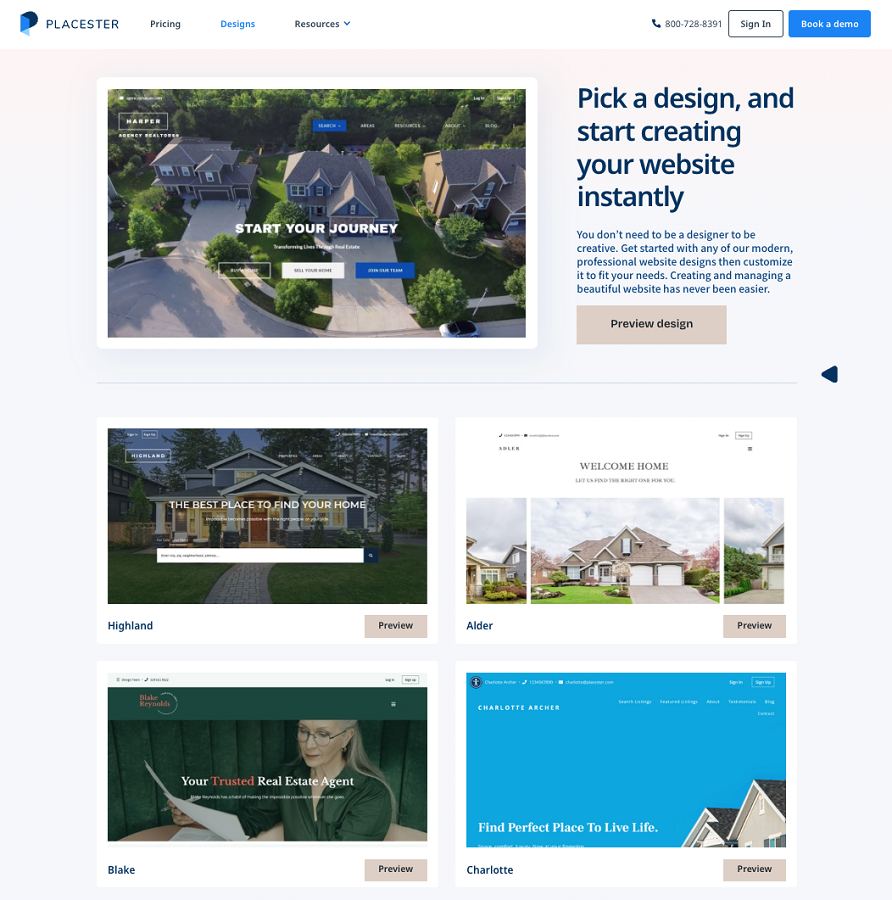
Placester website design templates you can choose from (Source: Placester)
If you don’t know how to build a website, enlist Placester’s services to create a fully customized website that is 100% codeless. Placester provides creative direction and tools to manage and customize your site yourself or with a website design expert. Plus, its websites are fully integrated with internet data exchange (IDX) listings and lead generation solutions. Placester also allows the seamless creation of landing pages for multiple listings to help you promote listings online and convert leads.
3. Outsource Your Real Estate Prospect Marketing
Successful real estate prospecting requires a solid marketing strategy with proven tactics and the ability to execute them. Your brokerage may offer some resources, such as photography and listings databases, but most agents must create their own marketing materials and manage their leads independently.
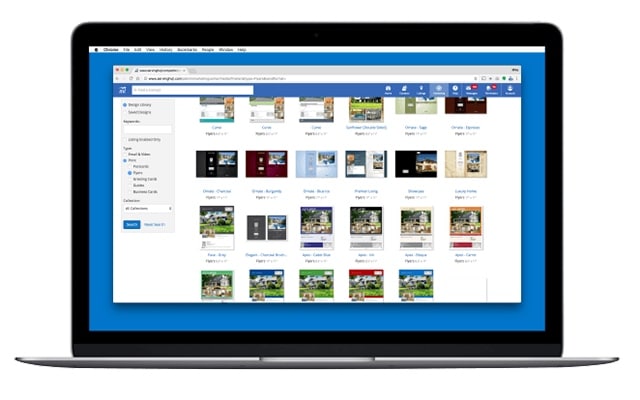
Market Leader’s Marketing Suite with premade content library
Strengthen lead generation and client conversion by outsourcing prospect marketing to platforms like Market Leader. With its comprehensive marketing suite, you can easily create professional, customizable marketing materials like email newsletters and print mailers. Market Leader automates multi-channel campaigns, including print, email, and phone communications, while assigning leads to specific campaigns.
Providing valuable content through email newsletters increases the chances of your contacts sharing it on social media or forwarding it. Additionally, physical print mailers can help you reach new demographics. Market Leader streamlines the entire process, from printing to mailing, allowing you to concentrate on your campaign’s success.
4. Make Real Estate Prospecting Part of Your Daily Routine
Effective prospecting for real estate agents is a skill that strengthens over time with practice and consistency. Allocate daily time for prospecting to generate leads and refine your strategies. Consistency ensures a steady flow of leads and fewer missed opportunities. Many successful agents and coaches suggest dedicating three hours daily to generate leads for a six-figure business.
Choosing the right time to prospect maximizes immediate client responses. For example, you probably won’t get many responses if you send emails or engage with social media leads at midnight. According to a study by CallHippo, the best time for cold calls is between 4:00 and 5:00 p.m., as it increases your chances of engaging with decision-makers in real time. Explore real estate cold-calling scripts for better connections and potential buyers.
5. Engage in Social Media
Social media is a proven way to establish your online presence and prospect new real estate clients. To make your social media strategy more effective, provide quality content, establish a following, and encourage followers to interact with and share your content with their connections.

Here are some best practices that you can use to enhance your social media marketing:
- Create regular social media content: Share valuable content on your social media, like property photos, client testimonials, real estate success stories, brand insights, and personal interests, to drive traffic to your website or landing pages. Adapt your content to each platform’s audience.
- Incorporate hashtags strategically: Use relevant real estate hashtags with keywords or phrases to attract clients interested in specific locations and home types. For example, if you focus on real estate in Miami, Florida, use hashtags like #miamirealestateagent, #miamirealestate, and #miamivacationhomes.
- Tag relevant social media profiles: Your posts can also geo-target niche audiences in areas you are interested in by tagging the corresponding neighborhood, location, or local business’ social profiles using the “@” symbol.
- Utilize social media ads: Create real estate ads on platforms like Facebook, Instagram, and LinkedIn to promote your services. Maximize their in-depth ad targeting capabilities to reach specific audiences based on location and interests.
6. Contact FSBO & Expired Leads
Another prospecting tip for real estate agents is finding for sale by owner (FSBO) or expired real estate listings. Agents can prospect for expired or FSBO listings by providing valuable expertise to help sell their homes and overcome objections they may have had when originally listing the property for sale.
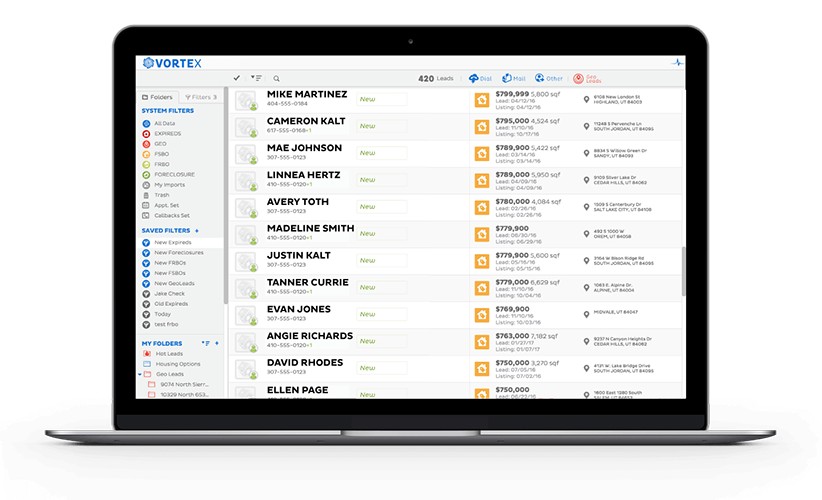
How to prospect for using REDX
Homeowners may try to sell their property themselves to save money, but they might lack the necessary skills to market effectively. Leverage this shortfall by highlighting the benefits of working with you to sell their home faster and potentially make more money in the long run. Use Mike Ferry scripts or any FSBO scripts to help you convert them into clients. Similarly, sellers with expired listings might be wary of agents due to previous experiences. Use expired listing letters or scripts for expired listings to win them over and boost lead generation.
Contacting all these homeowners can be daunting, but a service like REDX can assist in generating leads from FSBO and expired listings. The REDX power dialer calls through your list of contact numbers until you connect with potential clients, saving you time and improving your chances of success.
7. Get Face Time With Clients
Meeting prospects in person fosters deeper connections and clearer communication that simply cannot be conveyed electronically. Face-to-face interaction is a perfect opportunity to address concerns about the sales process and understand a lead’s interests, personality, and motivations for selling or buying. This adds a more personal touch essential for developing long-term relationships, loyalty, and trust.
Studies suggest that 93% of communication is non-verbal, encompassing facial expressions, gestures, posture, and tone of voice. This underscores the significance of non-verbal cues in our interactions. Thus, paying attention to these cues can help you better understand your client’s concerns and address them effectively.

You can find many chances to meet clients in person. When prospecting for real estate clients, ask questions and pick up on information like their favorite restaurant or bakery. Invite them for coffee, a meal, or other opportunities to get together. If you know their special occasions, like birthdays, use those as opportunities to meet up. If in-person meetings aren’t doable, suggest a virtual meeting via Zoom or other video conferencing sites. This option is convenient for clients, reduces physical contact, and offers the same benefits as in-person meetings.
8. Nurture Past Clients & Ask for Referrals
Past clients can be influential in expanding your network and growing your business. Since they’ve worked with you before, they’re aware of your real estate expertise. By offering real estate closing gifts and maintaining regular email contact, you stay top of mind for their future needs. Many client relationship managers (CRMs) like LionDesk and HubSpot offer customizable templates to fit your clients’ interests.
A solid relationship with past clients can also yield real estate referrals and reviews, which are cost-effective methods for generating leads. You can do it in person, on the phone, or by email. To simplify the process, use CRM automation, which has built-in processes for handling referral requests after a deal closes.
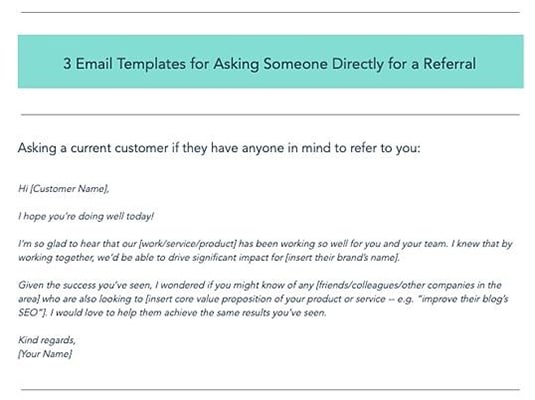
How to prospect clients in real estate using referral request emails (Source: HubSpot)
You can also ask for referrals from other contacts within your sphere of influence, such as friends, family, and former colleagues who had a positive experience with you. Use a personable approach in your email marketing outreach so contacts don’t feel like they received a mass email blast.
9. Farm Specific Areas
Tips on how to prospect in real estate also include real estate farming to establish yourself as the go-to agent in a specific area. Your farming campaign should target a location you know well, like where your business is based or where you live. The key is to pick an area and use marketing materials showcasing your expertise. Creating campaigns that offer value to homeowners in your chosen real estate farm area connects you with the right potential leads.

Prospecting for real estate agents using farming postcards (Source: PostcardMania)
Prospecting clients in your farm area can be done through in-person or community events, social media groups, or email marketing. You can also leverage postcard mailers to reach potential homesellers in your farm area. PostcardMania is a trusted service that makes the mailing process extremely simple. To save time, use PostcardMania’s in-house design services, and its team will print and mail the real estate farming postcards for you.
10. Become a Zillow Premier Agent (ZPA)
One way to find homebuyers to represent is by joining the Zillow Premier Agent (ZPA) program. This helps you reach active homebuyers directly by placing your agent information on active listings, along with the listing agent’s contact information. Furthermore, creating a ZPA profile gets your name out to prospective homebuyers and encourages them to reach out to you to represent them when purchasing a property.
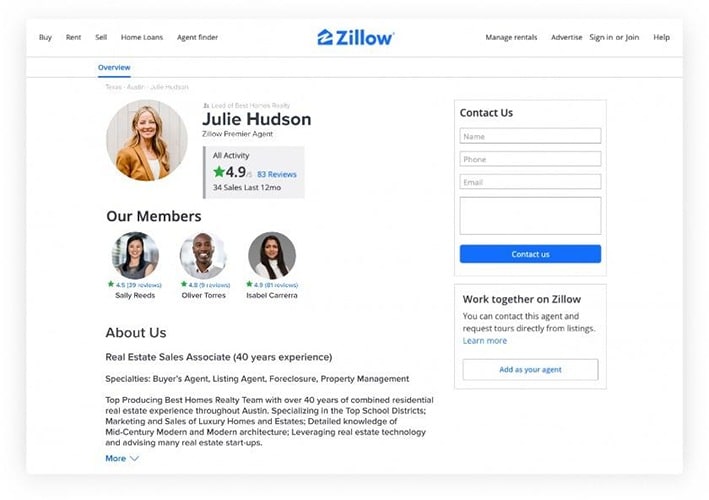
Sample Zillow Premier Agent profile
The Zillow Premier Agent platform does not require you to have exclusive listings to participate in the buying process. While you won’t know specifically when and where your contact information will be displayed, it does provide you with a percentage of impressions based on your chosen ZIP code, budget, and housing prices, with leads costing anywhere from $20 to $60 per lead. To maximize your real estate prospecting strategy, read How to Advertise on Zillow Successfully in 10 Steps.
11. Host Open Houses
Holding open houses is an exciting opportunity to attract prospective buyers when representing an exclusive listing. To maximize attendance, promote the event in advance and use clear signage with your contact details. Follow an open house checklist to ensure you’re well-prepared before, during, and after the open house.

Sample open house flyer (Source: Canva)
“For sale” and “open house” signs are tried-and-true real estate prospecting tools that turn neighbors and drive-bys into future clients. During the open house, have your sign-in sheet ready to gather visitor information, including real estate agents. Use these lists to prospect for leads and referrals. If a visitor comes without an agent, follow up and offer something valuable to assist with their property search.
12. Attend Networking Events
Another one of the best ways to prospect in real estate is by attending networking events. These events revolve around common interests, so choose the right ones to connect with the right people. To connect with fellow real estate professionals, join an Inman Conference or a National Association of Realtors (NAR) event, including real estate agents and brokerages. If you’d like to connect with various business professionals, look into events held by your local Chamber of Commerce or explore groups on LinkedIn or Facebook.
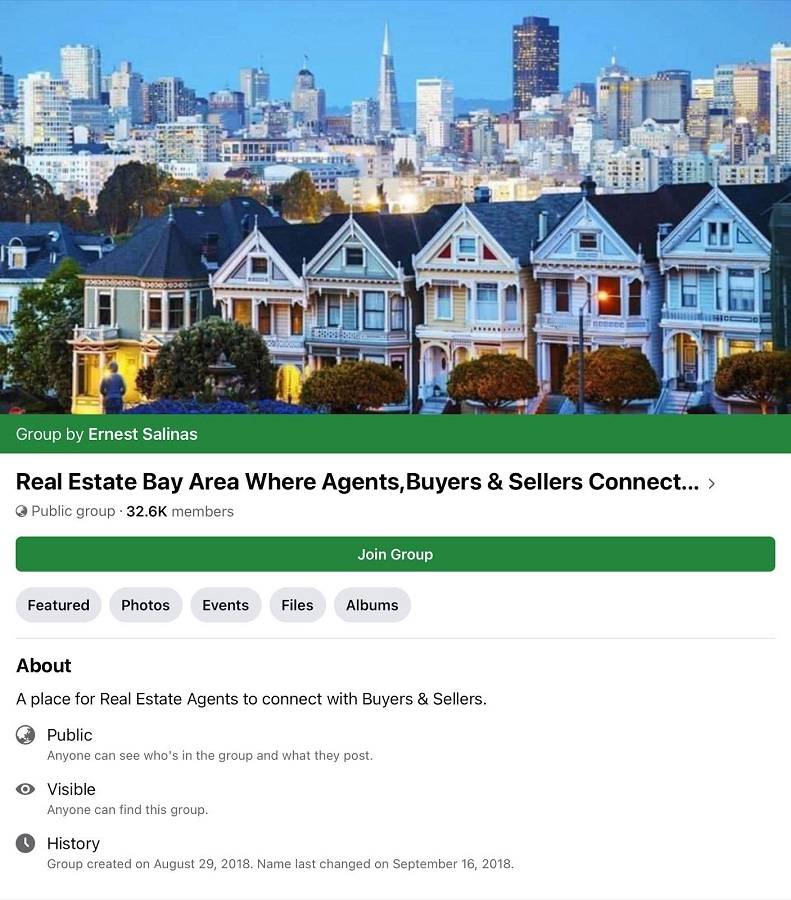
Sample Facebook group for realtors (Source: Facebook)
Preparation is key to success at a networking event. Create a 30- to 60-second elevator pitch summarizing your real estate experience, showcasing your value, and piquing interest in your services. Adapt your pitch to suit the event’s theme and practice it to make it stand out. Also, remember to carry business cards to share with potential clients and collect theirs as well.
13. Connect With Local Businesses
Connecting with local businesses can be mutually beneficial when it comes to prospecting. Partner with local businesses that strategically align with your business, such as homebuilders, handy services, trade specialists like landscapers, title companies, or a local credit union that offers mortgage loans. Then, you can create cross-promotional marketing campaigns that encourage leads to reach out to both you and your partner business.

If you frequent a local coffee shop, restaurant, bar, or store, ask the owner or manager to leave your business cards on the counter to promote your business to their clients. To sweeten the pot, consider offering an incentive to the business owner. For example, for every client they refer, you will purchase and give a gift card for the referral to use at their business. This creates a mutually beneficial business relationship that builds your local presence.
14. Become Active on Knowledge-based Forums
Crowdsourcing communities are untapped resources that can leverage your expertise when prospecting for real estate leads. Websites like Quora and Reddit have forums where people ask real estate-specific questions. These are the perfect platforms to engage with prospects and increase your online visibility. Quora allows you to create a profile and include links for location and business. It also has a section for you to list your topics of knowledge.
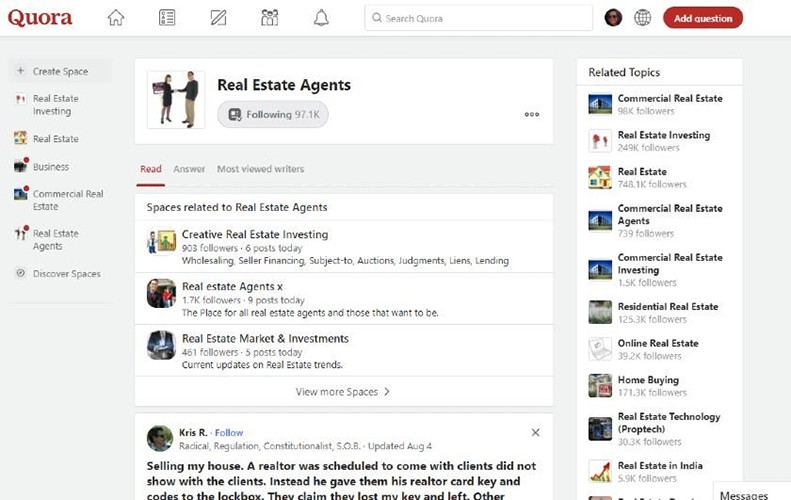
How to find prospects for real estate through real estate agent forums (Source: Quora)
Online forums are beneficial for lead generation because, as a user, you can select topics relevant to your expertise and provide insights. These forums further enable you to have an open dialog with target prospects and other users. Make sure your input is engaging and offers something of value without being transactional. Plus, you can leverage the topics to provide content for your other marketing platforms.
15. Get Involved in Your Community
Prospecting for real estate clients by being active in projects that matter to your community increases local brand recognition, building your potential client base while contributing positively to the community. Moreover, getting involved in your community creates organic connections with leads and enables you to develop meaningful relationships with individuals and other professionals in your neighborhood.
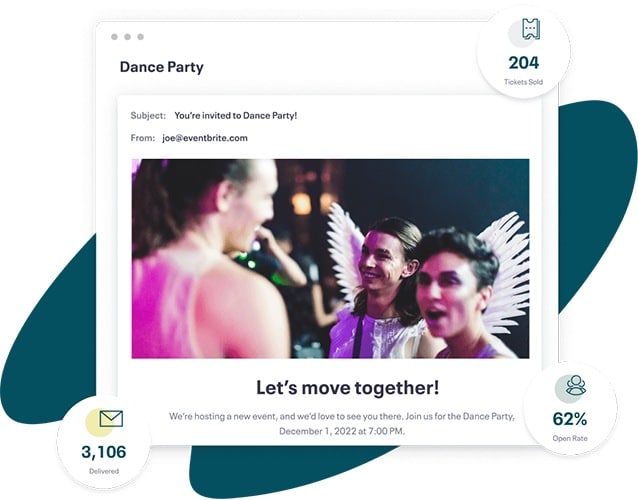
Real estate prospecting through community involvement using Eventbrite
Join local community activities, such as fundraisers, festivals, parades, charities, cleanup and beautification projects, school events, and community centers. Like networking, you want to add value and showcase your local real estate expertise so your business remains top of mind when these connections are ready to buy, sell, or provide a referral.
16. Follow Up Consistently With All Leads
Regularly following up with your leads is essential to developing a strong relationship that keeps your real estate services on top of your prospects’ minds. You will more likely catch them at the right time in their journey, such as just before or when they are ready to move forward with buying or selling a home.
For example, if a lead is interested in a listing, follow up with them by giving specific details about the home, inviting them to open houses, or sharing similar listings. If they inquire about the homebuying process, share resources like pamphlets, white papers, or videos and schedule a phone call to discuss their preferences. Be consistent in your outreach to increase the chances of converting them into clients.
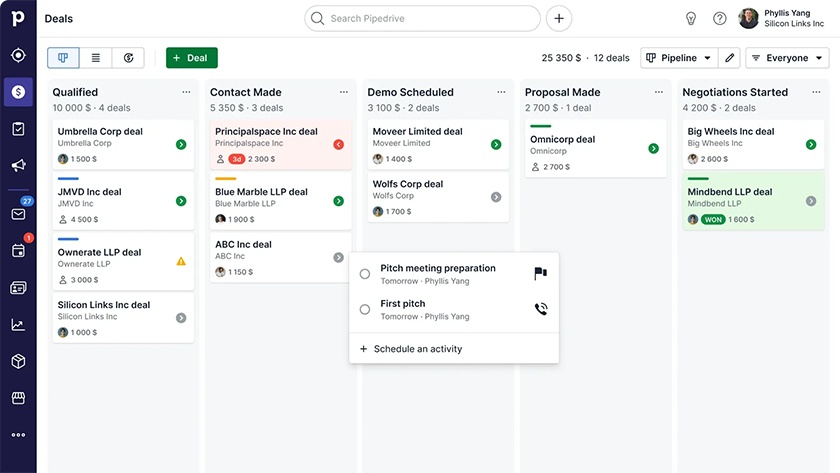
Pipedrive deal management module (Source: Pipedrive)
Clients can fall through the cracks if you’re managing a list of leads manually. A customer relationship manager (CRM) will make nurturing current and past leads more efficient. Pipedrive has sales automation, lead management tools, and insights to understand your business better. You can also set up workflow automation to execute tasks based on a series of events assigned to a contact. For example, once you input a deal closed date in Pipedrive, you can automatically send your clients a thank-you email or text them with a referral request.
Why Is Prospecting Important in Real Estate?
Prospecting in real estate is not just an optional step—it’s the heart and soul of a successful real estate career. Here are a few reasons why prospecting is important:
- Fuels business growth: Prospecting paves the way for fresh business opportunities. Without a steady influx of new clients and leads, your real estate business might hit a plateau or, worse, start to decline. Prospecting is your growth engine.
- Prevents stagnation: Businesses that don’t actively seek out new opportunities can become stagnant. Real estate is a dynamic industry, and staying relevant and competitive requires a constant influx of new prospects.
- Boosts revenue: More prospects often mean more sales. By casting a wide net and turning potential clients into actual buyers or sellers, you increase your revenue.
- Establishes yourself as an authority in the field: When you consistently bring in new clients and build a robust network, you establish yourself as an authority in your field. You become the trusted go-to resource for real estate needs in your market.
- Builds client relationships: Building relationships with potential clients early in their real estate journey can lead to long-lasting connections. Even if they’re not ready to move now, they might be in the future. By prospecting effectively, you nurture these relationships and position yourself as their first choice when the time comes.
Real estate prospecting is not just a matter of filling up your pipeline. It’s about driving your business’ growth and establishing yourself as a top and trustworthy real estate agent in the field.
Frequently Asked Questions (FAQs)
Effective real estate prospecting combines several strategies, including online marketing via websites and social media and networking with peers for referrals. Tactics like hosting open houses, cold calling, and direct mail campaigns are also essential.
Consider door-knocking and real estate farming to target specific areas. Listing properties on websites, content marketing, and seeking client referrals are also key. Additionally, targeting expired listings and FSBO properties and attending industry events are important. Success hinges on consistent engagement and adapting strategies to fit your market and clients.
To start prospecting in commercial real estate, begin by educating yourself about the market and building a network of industry connections. Define your niche and create a marketing plan that includes online and offline strategies. Research your local market, engage in cold calling and outreach to potential clients, attend property tours, and create valuable online social media content. Stay informed about industry trends and be patient and persistent in your efforts, as success in commercial real estate prospecting takes time and consistent dedication.
Yes, circle prospecting can be an effective technique in real estate. It involves reaching out to homeowners in a specific neighborhood or around a property you’re listing. By calling or mailing them information about the property, you can generate interest and potential leads. While it can be effective, its success largely depends on your approach and consistency, as well as factors like market conditions and the quality of your outreach.
Bottom Line
Success in real estate prospecting comes down to your ability to attract, establish, and nurture client relationships. The best real estate prospecting ideas incorporate both paid and organic online lead generation strategies and community involvement to connect with high-quality leads and add value. Not everyone will immediately close deals with you, but learning how to prospect in real estate will help you build a strong foundation to sustain and grow your real estate business.